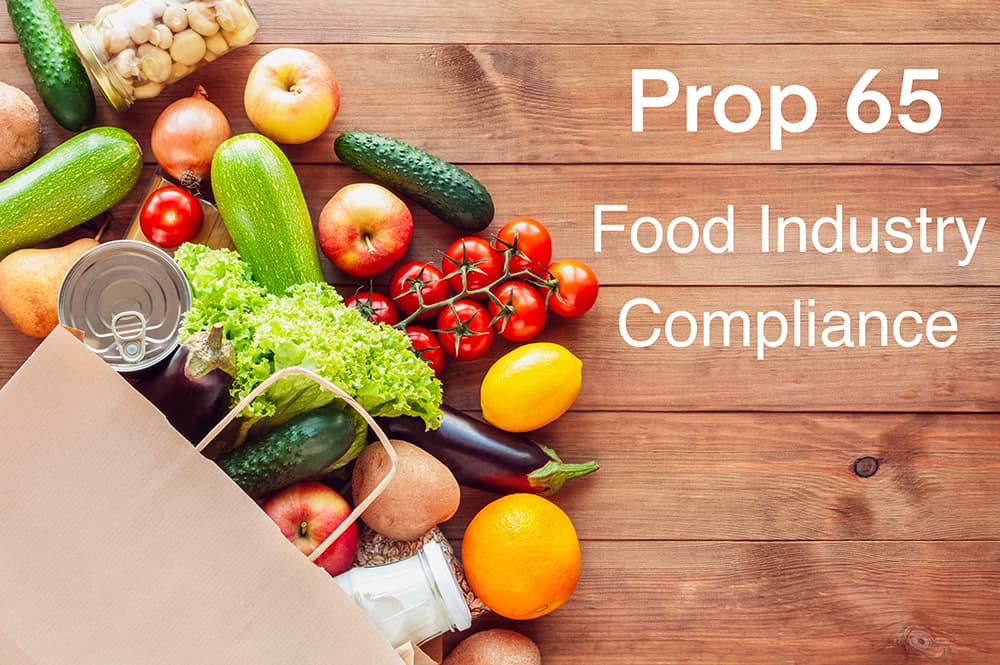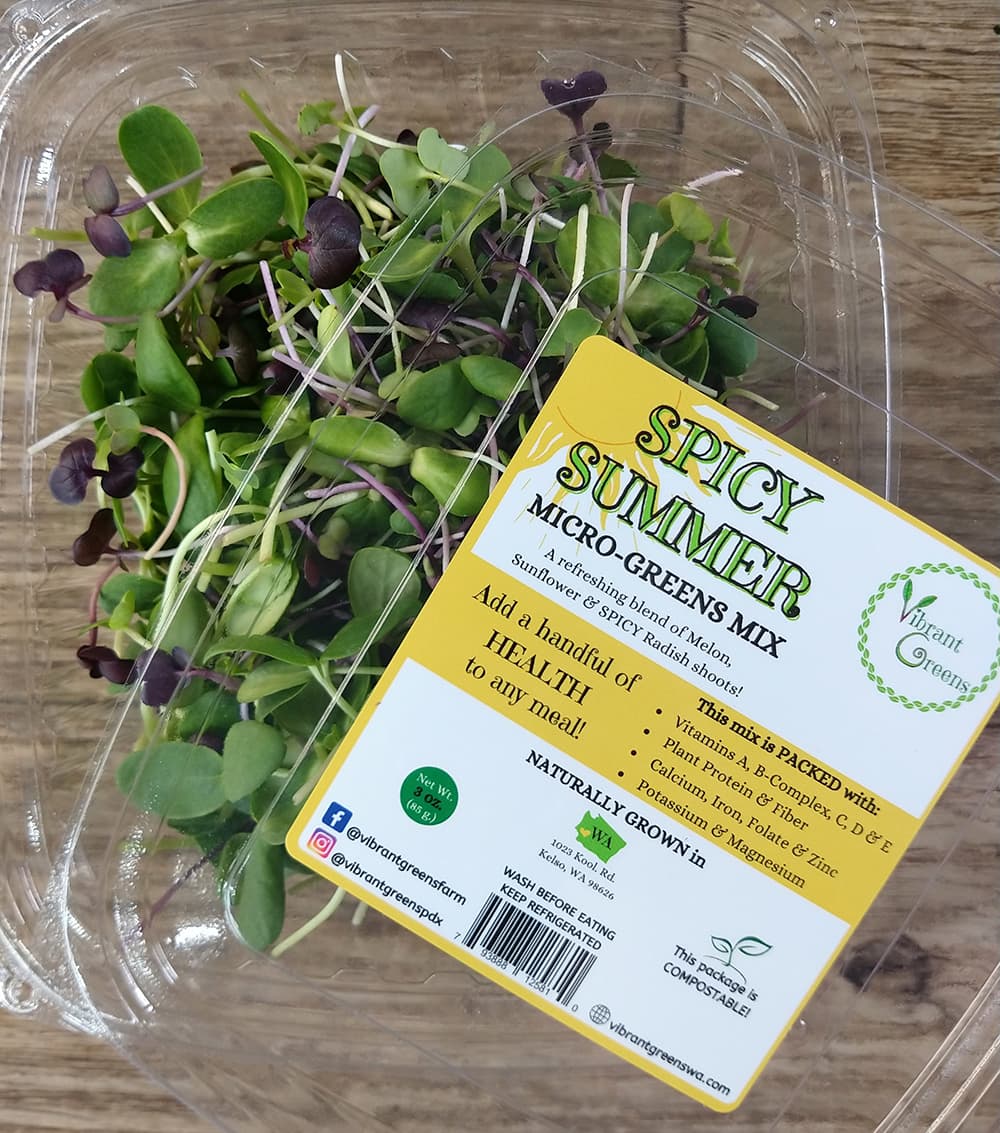Understanding Prop 65: Compliance for the Food Industry with Prop 65 Stickers
This entry was posted on August 28, 2024 .
If you’re in the food industry, you’ve likely heard about California’s Proposition 65, or Prop 65 for short. This regulation, officially known as the Safe Drinking Water and Toxic Enforcement Act of 1986, requires businesses to provide clear warnings if their products contain any chemicals known to cause cancer, birth defects, or other reproductive harm. For food manufacturers and sellers, this often means using Prop 65 stickers to inform consumers and remain compliant.
Prop 65 food compliance is crucial, particularly in the food industry, where certain chemicals can be present in everyday products. Understanding which chemicals are of concern and how to label your products appropriately can protect your business from legal penalties and build consumer trust.
Why Prop 65 Matters in the Food Industry


In the food industry, compliance with Prop 65 is a serious matter. Many common food items can contain trace amounts of chemicals that fall under Prop 65, such as:
- Acrylamide: Found in foods like coffee, baked goods, and fried snacks, acrylamide forms during the cooking process, particularly in high-temperature methods like frying or roasting.
- Lead: This heavy metal can be present in certain foods, especially imported goods like candies, spices, or even some types of pottery used for cooking.
- Mercury: Often found in certain fish species, mercury is a concern for products like canned tuna or other seafood products.
- Pesticides: Residues from pesticides can linger on fruits, vegetables, and grains, making Prop 65 warnings necessary for certain agricultural products.
Key Compliance Requirements:
- Chemical Listings: Prop 65 covers over 900 chemicals, and the list is updated annually by the California Office of Environmental Health Hazard Assessment (OEHHA). Food products may contain chemicals like acrylamide, lead, mercury, and certain pesticide residues that require Prop 65 warnings if present above the "safe harbor" levels.
- Safe Harbor Levels: These are specific thresholds set by OEHHA, below which a warning label is not required. However, if a product contains a chemical above these levels, a Prop 65 warning must be included. For example, the safe harbor level for lead in food is 0.5 micrograms per day for reproductive harm.
- Warning Labels: The law requires that warnings be "clear and reasonable," meaning they should be easy to understand and prominently displayed. In most cases, this involves using specific language approved by OEHHA, such as:
- For carcinogens: "WARNING: This product can expose you to [Name of Chemical], which is known to the State of California to cause cancer. For more information, go to www.P65Warnings.ca.gov.
- For reproductive toxins: "WARNING: This product can expose you to [Name of Chemical], which is known to the State of California to cause birth defects or other reproductive harm."
- Label Placement: The warning must be visible to the consumer prior to purchase. This means it should be placed on the product label, packaging, or, in some cases, on a shelf sign where the product is sold. The warning label must contrast with the background to ensure readability, and the font size should be no smaller than the largest font used for other consumer information.
- Internet Sales: For products sold online, Prop 65 also requires that the warning be displayed on the website before the purchase is completed. This is to ensure that consumers are fully informed, regardless of whether they are buying in-store or online.
Enforcement and Penalties:
Compliance with Prop 65 is not optional, and failure to adhere to the regulations can result in significant penalties. Civil penalties can be as high as $2,500 per violation per day, which can add up quickly for companies found in non-compliance. Moreover, businesses are often the target of private lawsuits under Prop 65, which can result in costly settlements or judgments, as well as legal fees.
To mitigate risks, it is crucial for food manufacturers and sellers to regularly test their products for Prop 65-listed chemicals and to update their labeling practices as new chemicals are added to the list or as regulations evolve.
Choosing the Right Prop 65 Labels and Stickers for Food Products
When it comes to Prop 65 compliance, the labels and stickers you choose are just as important as the warning they convey. Here’s what you need to consider for food products:
Material Matters:
For food products, durability is key, especially if your products are exposed to moisture, heat, or cold. BOPP (Biaxially Oriented Polypropylene) is a popular choice for Prop 65 labels and stickers due to its water and oil resistance. Eco-friendly options are also available for brands focusing on sustainability.
Designing for Clarity:
Your label design should prioritize readability. The warning must be clear and easy to understand. Typically, this means using bold fonts and high-contrast colors to make the text stand out. For food products, it’s especially important to ensure that warnings are easily visible to consumers before purchase.


Top and Bottom Labeling:
While the main warning is usually placed on the front of the packaging, don’t overlook the potential of labeling the top and bottom of the jar or container. The top is perfect for branding, such as your logo or product flavor, while the bottom can be used for UPC codes, batch numbers, or additional regulatory information. This ensures that all necessary details are covered without cluttering the main label.
Pro Tip: Consider using a secondary, back label if your product has extensive ingredients or warnings. This allows the front label to remain clean and focused while still providing all required information.
How Prop 65 Warnings Should Appear on Labels
When it comes to designing and placing Prop 65 warnings on labels or stickers, there are specific guidelines that must be followed to ensure compliance. The California Office of Environmental Health Hazard Assessment (OEHHA) provides clear rules regarding how these warnings should be displayed.
Font Size and Visibility:
The warning text must be clear and legible. For most consumer products, the font size should be no smaller than the largest type size used for other consumer information on the product. However, it must be at least 6-point font regardless of the surrounding text size. The warning should be placed in a way that ensures it is visible to the consumer before they purchase the product, either on the packaging itself or on a clearly visible shelf sign.
Standard Wording:
The content of the warning can vary depending on the type of product and the chemicals involved, but generally, a Prop 65 warning must include the following elements:
- For carcinogens: "WARNING: This product can expose you to [Name of Chemical], which is known to the State of California to cause cancer. For more information, go to www.P65Warnings.ca.gov."
- For reproductive toxins: "WARNING: This product can expose you to [Name of Chemical], which is known to the State of California to cause birth defects or other reproductive harm."
Examples:
- A food product might require a warning like: "WARNING: Consuming this product can expose you to acrylamide, which is known to the State of California to cause cancer. For more information, visit www.P65Warnings.ca.gov/food."
- A beauty product could carry a label stating: "WARNING: This product contains formaldehyde, a chemical known to the State of California to cause cancer."
Pro Tip: Make sure the warning label contrasts with the background of the packaging to ensure maximum readability. The use of symbols, such as an exclamation mark within a triangle, can also help draw attention to the warning.


Prop 65 in Other Industries
While food products are a significant focus under Prop 65, the regulation also applies to a wide range of other industries. Products in beauty and personal care, household goods, consumer electronics, jewelry, and construction materials often require Prop 65 warnings as well.
Here are some examples:
- Beauty and Personal Care Products: Items like shampoos, lotions, makeup, and soaps often include chemicals such as formaldehyde, which is commonly used as a preservative and may require a Prop 65 warning.
- Household Goods: Cleaning products, air fresheners, and even furniture can contain chemicals like phthalates or formaldehyde, making them subject to Prop 65 regulations.
- Consumer Electronics: Devices such as laptops, phones, and headphones might include chemicals like lead or cadmium, which require appropriate labeling under Prop 65.
- Jewelry and Accessories: Metal components, particularly in costume jewelry, may contain lead or nickel, both of which are on the Prop 65 list.
- Construction Materials: Products like paints, adhesives, and building materials may include chemicals that necessitate a Prop 65 warning, especially if they release fumes or dust during use.
Including a Prop 65 warning on these products not only keeps you compliant but also informs consumers of potential risks, fostering trust and transparency.
Wrapping It Up
Staying compliant with Prop 65 is essential for any food business operating in or selling to California. By choosing the right Prop 65 labels, regularly reviewing your products, and keeping your customers informed, you can navigate these regulations confidently.
Whether you need durable labels or guidance on compliance, Lightning Labels is here to help you meet your labeling needs with quality and precision.
FAQs About Prop 65 and Food Industry Labels
What does Prop 65 mean for food products?
Prop 65 requires food products containing certain chemicals to carry a warning label or Prop 65 sticker. This helps inform consumers of potential risks related to cancer or reproductive harm.
Which materials are best for Prop 65 labels?
BOPP is highly recommended for its durability and resistance to water and oil. Eco-friendly materials are also available for sustainable branding.
Can Prop 65 warnings be placed on the back of the packaging?
Yes, as long as the warning is clear and conspicuous. However, it’s often better to place the warning where it’s most visible, like the front label.
How often should Prop 65 labels and stickers be updated?
Labels and stickers should be reviewed and updated whenever there are changes to your product’s ingredients or when new chemicals are added to the Prop 65 list.
Are all food products required to have Prop 65 labels or stickers?
No, only products containing chemicals listed under Prop 65 at levels above the safe harbor threshold require a label or sticker.

 Custom Labels
Custom Labels  Custom Beverage Labels
Custom Beverage Labels  Custom Lip Balm Labels
Custom Lip Balm Labels  Custom Warning & Safety Labels
Custom Warning & Safety Labels  Perfume Bottle Labels
Perfume Bottle Labels  Bumper Stickers
Bumper Stickers  Custom Prop 65 Warning Labels
Custom Prop 65 Warning Labels  Custom Stickers
Custom Stickers